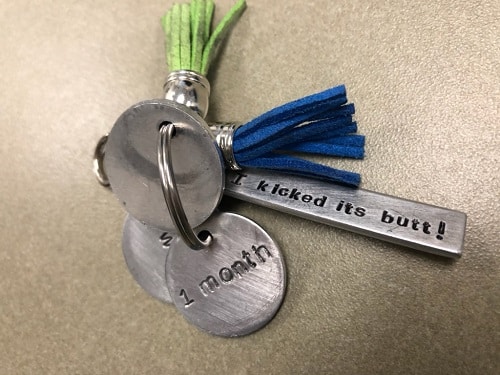 Staff and clients of Houston Recovery Center now have the opportunity to get healthier if they are struggling to quit smoking. Our agency kicked off a free smoking cessation program in October 2019 offered to both employees and clients enrolled in our recovery programs.
Staff and clients of Houston Recovery Center now have the opportunity to get healthier if they are struggling to quit smoking. Our agency kicked off a free smoking cessation program in October 2019 offered to both employees and clients enrolled in our recovery programs.
Gina Bryan, Director of Intake and Opioid Services, and John Turner, Field Recovery Support Specialist, completed a week-long Certified Tobacco Treatment Training program offered through MD Anderson. They are now qualified to offer behavioral and motivational counseling to participants in the program as certified tobacco specialists.
“We help people understand it’s not all or nothing,” states Bryan. “Even slowly reducing how much and often they smoke helps them become healthier.”
The comprehensive certification course Bryan and Turner attended covered a variety of topics including tobacco dependence knowledge, counseling skills, diversity, pharmacotherapy, relapse prevention, treatment planning, assessment instruments, and law and ethics.
Secrets of Success
According to Bryan, around 75 percent of Houston Recovery Center staff are smokers. When an employee hears of another employee who quit, they want to join the program, too. The program combines weekly individualized coaching and nicotine replacement therapy (NRT) options. Since October, the program has registered 11 employees and 10 clients. Fifty percent remain active.
 Employees and clients receive award incentives (chips) given at one week, one month, three months, six months, and one year intervals celebrating the stages of discontinued use.
Employees and clients receive award incentives (chips) given at one week, one month, three months, six months, and one year intervals celebrating the stages of discontinued use.
“I keep encouraging participants and telling them they’re doing really well,” Turner relates. “When I visit with our clients in recovery, I see what I can do to help keep them on the right track with their smoking, too.”
Two employees hit the three-month mark in early January – Chad Armstrong and Jessica Yeager. Bryan says she is doubly proud of Armstrong and Yeager, who work together in UTHealth’s HEROES program, because they quit on Day 1 and have never smoked again.
Bryan believes that keeping close tabs on participants is one reason the program is so successful. “Our goal is to discover and mitigate their triggers, so they don’t get into a compromising situation again,” Bryan says. “The recovery process is very different for each person.”